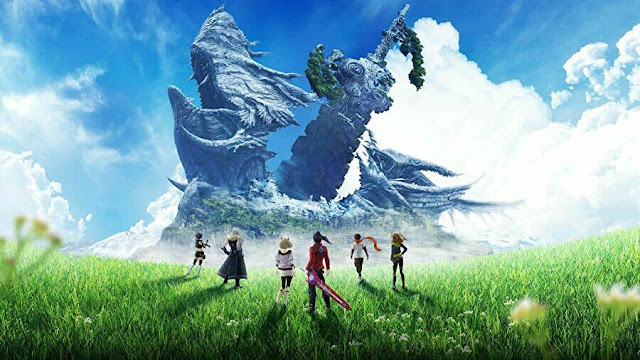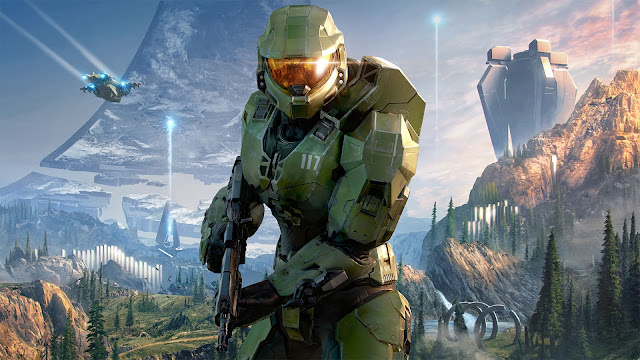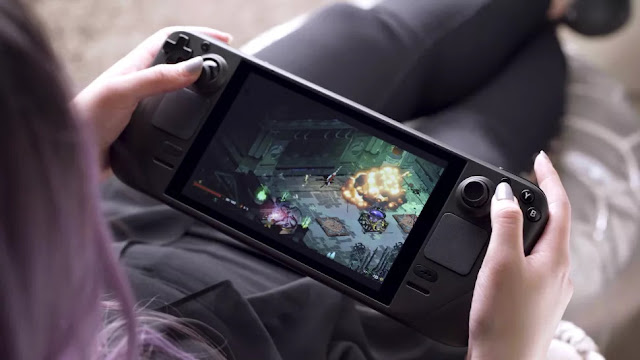Xenoblade Chronicles 3, Genesis, and The Orignal Sin
Xenoblade Chronicles 3 is one of my all time favorite games, an easy Top 10 greatest for me. It's story is magnificent even if it stumbles by the end, it's design adopts my favorite class system from Final Fantasy V, and the game pushes the Switch to it's limit. It's like Metroid Dread in that it was my dark horse Game of the Year. Indeed, the only downside is that The Game Awards didn't give the game the love it deserved. Losing to God of War for best soundtrack? Not even getting a nomination for best story or voice acting? Seriously?
It's snub at the Game Awards aside, Xenoblade 3 is a game chock full of deep themes and messages about war, love, loss, the nature of humanity in the face of hardship, and bitchin guitar/flute duets. But one thing I don't think a lot of people talk about is the games ties into The Book of (Sega) Genesis from the Bible. Not just how it has parallels, but how it criticizes specifically the creation of humanity portrayed in Genesis. Bold claim isn't it? Well before y'all burn me for heresy, let me explain.
(Obviously Xenoblade Chronicles 3 spoilers from here on out, you all have been warned.)
For those who need a refresher, the Bible's Book of Genesis states that humanity started with a man named Adam and a woman named Eve (or was it a guy named Steve?) who lived in an idyllic paradise called Eden. One day Eve gets tricked by a snake into eating an apple, the one thing God said to never do. Eve then has Adam take a bite and both are cast out of Eden by God, forced to walk the Earth for their "original sin". In the end their descendants would one day become modern man, meaning everyone is everyone's distant cousin, ew.
Now how does all this tie into a plot entirely different from any of that? Xenoblade 3's plot is about two squads from the rival armies of Keves and Agnus. Both learn the truth of their forever war and gain superpowers from a device called the Ouroboros Stone that allows them to turn into giant Evangelion references. Using their superpowers, these six; Noah, Mio, Eunie, Taion, Lanz, and Sena now fight to destroy the true puppet masters behind their forever war. Like I said, seems totally unrelated, right?
Well the first and most obvious comparison to Genesis is the name of what gives Xenoblade 3's protagonists their powers along with what they call their group, Ouroboros. For those who've never seen an Ouroboros or watched Fullmetal Alchemist, it's famously depicted as a snake eating it's own tail. Which is a lot like like the snake that tricked Eve into eating the apple in Genesis.
Much like Adam and Eve, Ouroboros are also cast out for their change. Both squads try to return to the life they knew but their fellow soldiers chase them out of their camps, trying to mindlessly kill those who are changed. It's a lot like how God cast Adam and Eve out of Eden for their change, though he didn't try to kill them. Unless you count the flood he sent to their descendants, I don't.
Of course if it were just a similarity to snakes there wouldn't be much to go on. So what takes the reference to Genesis up a notch is the state both groups are in before and after their change. Adam and Eve lived in ignorance, unaware of hardship or even things like gender and the shame of their own nudity. Once Adam and Eve take of the Apple however they become aware of these things and cover themselves up. Which is how God finds out about their sin despite their attempt to lie about it.
Similarly, despite being in a forever war, Ouroboros also lived in ignorance before they met one another. In the first chapter of the game we follow the Kevesi soldiers Noah, Lanz, and Eunie as they live their lives in their own kind of ignorance. Never having to worry about anything beyond filling up the flame clock that keeps them alive. On top of this the game shows that Noah and Lanz, both guys, are comfortable being stark naked in a bathhouse with Eunie, a girl.
Now the nudity thing is something you likely wouldn't think much of at first, I sure didn't. These three soldiers are clearly shown to be life long friends and comrades. Which leads one to conclude that these three being naked around each other isn't a big deal. I've been in locker rooms where guys are just comfortable being naked around each other and this trio's friendship overrides the gender gap... right?
Well once they meet their Agnian counterparts and get hit by the Ouroboros Stone, the entire battle-scarred group decide to change into less ruined clothes that they scavenge from the wreck of a third faction. Here, all of a sudden, Noah and Lanz are joined by Taion in becoming nervous and quickly scurrying away from the girls in their group to change somewhere out of sight.
The thing to note here is that Noah and Lanz aren't uncomfortable getting naked in front of Taion (and vice versa), a guy they literally just met and were trying to kill hours earlier. But they are now uncomfortable getting naked in front of the girls in their group, which as we've seen wasn't an issue before. It's played up for a brief moment of levity as even the girls are confused by this, but it's also a sign that the Ouroboros stone may have given this group a sense of shame and gender; just like the Apple did to Adam and Eve.
Also during the course of the game the Ouroboros group are also shown dealing with emotions they never had to before. Indeed members of Ouroboros even begin feeling romantic attraction, a large part of the plot involves Noah and Mio gradually falling in love with one another. But these new emotions also apply to the world and how nature itself acts, things they never noticed before. Which one could see as their ignorance being gone, just like Adam and Eve's was.
Outside of Noah and Mio's romance these may be just a few small character moments for sure, but the similarity to the Book of Genesis is fairly striking if I'm being honest. What I haven't explained however is how Xenoblade 3 criticizes the creation portion of Genesis. Well it's because of what the taking of the Apple is referred to, the "original sin," implying that taking the apple was wrong and that this life we live is misery because of it.
One of the largest themes in Xenoblade 3 is confronting this idea in Genesis and countering it. Xenoblade 3 reveals the main villains locked the world in a forever war because they felt the ignorant simplicity of it was preferable to the misery of normal life. That no one in their nations who is killed actually dies but are rather reborn in a perpetual cycle of ignorance and war. Indeed one of the minor villains spends her time trying to enter that cycle because she feels it's an escape from the misery of knowledge and choice.
But then Chapter 5 happens and Xenoblade 3 presents it's counter-argument, having Ouroboros reach a city of people similar to them sans super powers. They learn how the people in the City freely express themselves, how they partake in life' pleasantries like art and writing, but most importantly do more than just ignorantly fight and be reborn to do it again. Ouroboros even visit a maternity ward in the game's single most wholesome moment where they witness the miracle of life being born, a moment that actually stuns and amazes the group.
 |
| Chapter 5 will also rip your heart out by the end. |
Indeed the City is shown that, while imperfect and full of political strife, the residents there have more to live for than in any of the Agnian or Kevesi war camps you encounter throughout the game. At least before you sever their flame clocks, which frees those camps from needing to fight. But even that is imperfect as the camps are shown trying to adjust to their free lives, but even the struggles that they face are shown as preferable to their old ignorance as the people in those camps begin expressing themselves in ways they didn't before.
And that's the crux of Xenoblade 3's criticism of Genesis creation tale. Taking the apple may have opened up humanity to things like strife and misery, but it also opened us up to the wonders of life. We could not live the life we do, for good and bad, if it had not been for that "original sin" of taking the apple. So at the end of the day was it really all that evil? I mean the serpent in Genesis was being a dick but beyond that I mean?
Sure, Xenoblade 3's ignorance isn't the blissful peace that Adam and Eve knew, in fact it's the opposite, but the point is the same. And it doesn't distract from the comparison and criticism of Genesis' creation tale that Xenoblade 3 is going for. At the end of the day, it's things like this that make Xenoblade 3 a game worth talking about for years to come. Now bring on that Founder's DLC, Monolithsoft, I saw that trailer with Shulk and Rex and I'm hyped.











Comments
Post a Comment